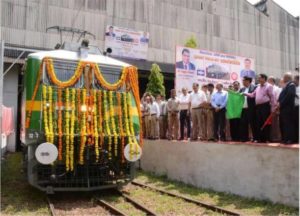Confusing? Even as BHEL Flags off 6,000 HP Electric Locomotive, GE announces approvals for its diesel loco

In a move towards more eco-friendly methods and giving impetus to the ‘Make In India’ program, the country’s largest power equipment manufacturer, Bharat Heavy Electricals Ltd (BHEL), flagged off its first 6,000 Horsepower Type WAG-9H electric locomotive.

“The 6,000 HP locomotive has been manufactured against a prestigious order from the Railway Board for 30 locomotives. Significantly, this is the first electric locomotive equipped with state-of-the-art IGBT based 3-phase propulsion system with regenerative braking and air-conditioned cabin & water closet, to be manufactured by BHEL,” the company said in a statement.
The locomotive was flagged off by Ghanshyam Singh, Member Traction, Railway Board in the presence of BHEL Chairman & Managing Director Atul Sobti from the company’s Jhansi plant. Also present on the occasion were directors on the board of BHEL and senior officials from Indian Railways.
BHEL has developed a centre for research and development in transportation technology and manufacturing facilities at Bhopal, Jhansi and Bengaluru plants. The company also has a loco manufacturing facility with a capacity to manufacture 100 locos per year and has already supplied 360 mainline electric locomotives to Indian Railways.
BHEL will alone meet over a half of the railways’ requirement for electric propulsion equipment for rolling stock. The company is also developing the country’s first Air-conditioned AC EMU train for the Mumbai sub-urban region, with IGBT based 3-phase drive propulsion equipment. Last year, it was reported that the company had secured a contract for 146 sets of IGBT-based 3-phase electrics for 25 KV AC Mainline EMU (MEMU) trains. A statement released by the company stated that valued at an amount of Rs 672 crore, the order has been placed on BHEL by the Rail Coach Factory (RCF) in Kapurthala.
The company is taking up multiple diversification initiatives to increase its non-coal business. It has forayed into manufacturing of metro coaches, rolling stock for high speed railway, railway electrification and environmental friendly and efficient rolling stock.
Interestingly, BHEL’s announcement comes at the same time as the announcement from GE that Indian Railways has confirmed its acceptance of GE’s 4,500-horsepower diesel-electric Evolution Series prototype locomotive. This was achieved after the successful completion of rigorous testing on Indian Railways’ tracks following the locomotive handover in February 2018.
The GE deal is part of a $2.5 billion agreement signed in 2015 in support of the Government of India’s Public Private Partnership ‘Make in India’ program. The deal included an order for 1,000 locomotives, as well as the establishment of a new GE Transportation factory and maintenance sheds in India. The deal seemed to be in trouble briefly,with the government possibly having second thoughts on the need for investing in more diesel locos., after a Comptroller and Auditor General report (CAG) flagged it as an aberration from the railways strategic vision for faster electrification. But now, the project is apparently back on track and has achieved key milestones too. GE’s state-of-the-art Rosa Maintenance Shed in the state of Uttar Pradesh, India, is ready for operations and the construction of the factory in Madhepura, Bihar, is in advanced stages towards completion. Operations will begin in the fourth quarter. Once fully operational, all locomotives built in Madhepura under the agreement will have 70 percent localized content.
When last heard, the Railway Minister, Piyush Goyal claimed that the GE locos would be useful for borer areas and other high maintainance areas as a back up even, even as the railways remains comitted to its 100% electrification plan by 2021-22.
Either way, it does look like the deal with GE might just come back to raise more questions than it answers right now.




